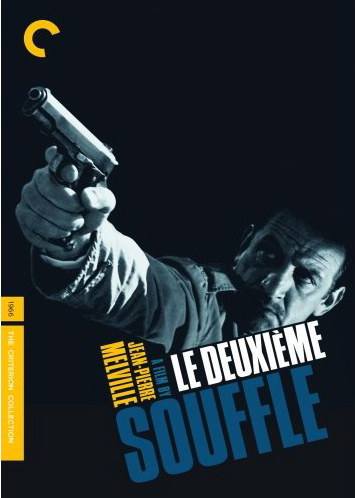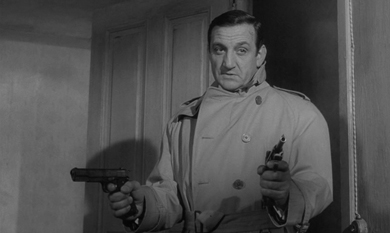| Release List | Reviews | Price Search | Shop | Newsletter | Forum | DVD Giveaways | Blu-Ray/ HD DVD | Advertise |
| Reviews & Columns |
|
Reviews DVD TV on DVD Blu-ray International DVDs Theatrical Reviews by Studio Video Games Features Collector Series DVDs Easter Egg Database Interviews DVD Talk TV DVD Talk Radio Feature Articles Columns Anime Talk DVD Savant HD Talk Horror DVDs Silent DVD
|
DVD Talk Forum |
|
|
| Resources |
|
DVD Price Search Customer Service #'s RCE Info Links |
|
Columns
|
 |
Le deuxième souffle |

|
Le deuxième souffle Criterion 448 1966 / B&W / 1:66 anamorphic widescreen / 144 min. / Street Date October 7, 2008 / 39.95 Starring Lino Ventura, Paul Meurisse, Raymond Pellegrin, Christine Fabréga, Marcel Bozzuffi, Paul Frankeur Cinematography Marcel Combes Production Design Jean-Jacques Fabre Art Direction Film Editor Michele Bohem, Monique Bonnot Original Music Bernard Gerard Written by Jean-Pierre Melville, José Giovanni from his book Un reglement de comptes Produced by André Labay Directed by Jean-Pierre Melville |
Nothing is more exciting for a film fan than suddenly becoming aware of an entire new subgenre. Criterion has floored us time and again with great French crime pictures from the 1950s and 1960, such as Rififi chez les hommes, Bob le flambeur, Touchez pas au Grisbi and Classe tous risques. The Jean-Pierre Melville picture Le deuxième souffle ("Second Breath") is an absorbing cops and robbers tale that reconnects with the hardboiled vein abandoned by American filmmakers.
We understand that an almost shot-for-shot remake was released in 2007; it wasn't well received.
Le deuxième souffle presents a prototypical Melville loner dodging a number of double-crossing associates while trying to remain faithful to his crook's code of honor. With a nervous cutting style, Melville reports days and dates with on-screen titles as one fumbled killing leaves Inspector Blot with just enough clues to know that Gu is back in action again. A drawn-out, realistic heist is followed by more surprises until the inevitable violent showdown. Any more detail would risk the very enjoyable surprises in this superior crime saga. Among the cast of killers are Raymond Pellegrin of Nicholas Ray's Bitter Victory, and Marcel Bozzuffi, the assassin chased by Gene Hackman in William Friedkin's The French Connection.
Lino Ventura lends his weary face to Gu Minda, a crook who doesn't believe in happy endings. He's a cold-blooded cop killer but also freakishly sympathetic, a quality insured by the loyalty of Manouche, who would rather he skip the heist and flee with her to Italy. Gu makes no foolish moves, but we can tell that fate and Inspector Blot will eventually trip him up. Gu sweats and suffers and kills without mercy, but he's reluctantly accepting of his fate. Director Melville goes for action scenes played for logic and clarity, and an essentially existential leading character. His next film Le samouraï would take the full leap, with a hero so ultra-cool that he shows little emotion even when walking into a deadly trap.
The long (144 minutes!) picture has plenty to keep us interested. The detailed relationships and dialogue are largely the work of author / co-screenwriter José Giovanni, an ex-con survivor of death row. One of the more suspenseful scenes shows a pair of killers each casing a room to be used for a meeting, looking for places to hide weapons.
The self-styled Melville's personal touches show throughout. French hoods always drive large American cars; the hero is a quiet guy who takes no guff from anyone. Melville maintained his own modest studio for the many small interior sets. An iron staircase to the director's upstairs apartment couldn't be moved, so it figures in the art direction. To cut costs, the stone walls of a hideout used to stash stolen platinum appear to be photo blow-ups!
In a Melville picture, the violent hero always risks everything to preserve his self-image as an honorable crook. In this case a clever maneuver by the wily Inspector Blot forces Gu into a potentially suicidal confrontation. Gu crashes into a room full of hoods, with a pistol in each hand. He has the drop on all four men.

The image of Gu holding those guns, and then firing both of them as he rolls along the floor, has been noted as the source inspiration for the stylized gunplay in John Woo's The Killer, which influenced yet another generation of action films.
Melville's minute of suspense is followed by only a few seconds of action, but he gets a maximum impact from his effort. In keeping with his admiration for "professional" values, Melville has the dogged Inspector make sure that the press learns the truth about the shootout, thereby rescuing Gu's pro reputation. At the height of the Spy crazy 1960s, José Giovanni and Jean-Pierre Melville maintain the hardboiled crime genre abandoned by the American mainstream.
Criterion's DVD of Le deuxième souffle is an excellent enhanced widescreen transfer in quality B&W. Scholars and critics Ginette Vincendeau and Geoff Andrew provide a detailed commentary, and an amusing interview with director Bertrand Tavernier, who served as the film's publicity agent, brings a new perspective to Melville's work. Older interviews from French TV put Melville and actor Lino Ventura front and center. Criterion producer Issa Clubb taps critic Adrian Danks for the insert booklet essay, and tops the disc off with an original trailer.
Day and date with Le deuxième souffle, Criterion is also releasing Jean-Pierre Melville's excellent Le Doulos, with Jean-Paul Belmondo and Serge Reggiani.
On a scale of Excellent, Good, Fair, and Poor,
Le deuxième souffle rates:
Movie: Excellent
Video: Excellent
Sound: Excellent
Supplements: Commentary, interviews, trailer, insert booklet essay
Packaging: Keep case
Reviewed: October 4, 2008
Reviews on the Savant main site have additional credits information and are more likely to be updated and annotated with reader input and graphics.
Review Staff | About DVD Talk | Newsletter Subscribe | Join DVD Talk Forum
Copyright © MH Sub I, LLC dba Internet Brands. | Privacy Policy
Subscribe to DVDTalk's Newsletters
|
| Release List | Reviews | Price Search | Shop | SUBSCRIBE | Forum | DVD Giveaways | Blu-Ray/ HD DVD | Advertise |





